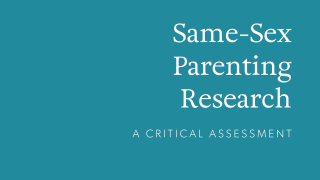New book that supports claim ‘children do best with a mother and a father’ launches in London

On Tuesday 29th January 2019, new research that supports the claim that ‘children do best with a mother and father’ launched in London.
The new Wilberforce Publications title, Same-Sex Parenting Research: A Critical Assessment, looks scientifically at the effects of same-sex parenting (SSP), providing a careful and detailed examination of nearly 400 studies, disputing the view that there is “no difference” between SSP and heterosexual parenting.
Author Walter R. Schumm PhD is Professor of Applied Family Science in the School of Family Studies and Human Services at Kansas State University. He is also editor-in-chief of the academic journal, Marriage and Family Review, and has written many books and articles on family and parenting.
“The road to hell – paved with good intentions”
Andrea Williams, CEO of Christian Concern, gave the opening address, saying the hope was that this book might shed some light on the real effects of SSP compared to heterosexual parenting.
She made direct reference to the recent case of Richard Page, who was struck off as a magistrate and then blocked from an NHS directorship role for expressing the view that children do best with a mother and a father. The Christian Legal Centre is currently supporting Richard as he appeals against the NHS trust. Schumm’s research backs up Richard’s view.
Professor Schumm was able to introduce his work via a live video link to Kansas, where he spoke of his research and debunked the belief that SSP does no harm. He began by speaking of his own father: “My father used to say that the road to hell was paved by good intentions; he was wrong. It is paved by good intentions and bad statistics and weak scientific theory.”
His argument was that what we have been told about SSP is not entirely true; investigations that have been made have not delved deep enough into the data and have therefore been skewed to tell a very different story from the reality of the issue.
Schumm summarised the consensus view of ‘no difference’ theory, giving examples of scholars who have supported it, such as Evelyn Hooker, Dr Susan Golombok and Dr Michael Lamb. Yet the problem, he concluded, was that because they have attained the status of “universal scientific consensus”, anyone who disagrees with them “is unworthy of being known as a good scientist and deserved to have their reputation and career destroyed.”
However, research has been done that challenges the consensus; it is simply silenced. He gave the example of Professor Mark Regnerus (University of Texas), who faced intense criticism for publishing an article questioning the ‘no difference’ view. Speaking candidly in the question time, Schumm revealed that even with his own research, “I had students complain – they were very sensitive around me. … It’s very subjective [the complaints], and we find ourselves having to justify why I haven’t been fired yet.”
But if one looks closely even at the research from supporters of SSP, there are holes. Schumm spoke particularly of Evelyn Hooker’s research: “Most scientists have interpreted her work as proving no differences – yet her own work – and replications of her work – both show there were differences!”
Is SSP less stable?
The need for further detailed research into the effects of SSP is great. Schumm questioned the quoted figures on how many children are being raised by same-sex parents in the USA, which are contradictory to begin with, and the stability rates of children with same-sex parents.
One paper currently under review finds that greater instability occurs for same-sex couples with children. The opposite is true for married heterosexual couples. Schumm continued by questioning whether children raised by same-sex parents are different in terms of both sexual orientation, in their use of illegal drugs, and in terms of fertility rates. His research would suggest that the differences are certainly worth investigating further.
Challenging the consensus
Schumm concluded that it would ultimately be bad for society if all scientific research conformed to the accepted consensus: “You can’t learn anything if everything always supports what you already believed or have concluded.”
In terms of what this means for SSP, he argued, academics need to start properly “digging into” the data to find out what it really means, rather than using it to simply back up a political agenda. But this requires scientists, researchers, doctors, families, children of same-sex parents, etc. to speak out.
For Schumm, he believes that it is worth being “on the right side of the data” even if means being portrayed as on “the wrong side of history”.
Andrea Williams closed the launch by encouraging people to keep pressing on in the truth. She said: “the truth will win out in the end.”
Buy your copy of Same-Sex Parenting Research (kindle/paperback)
Read our live twitter feed of the launch
